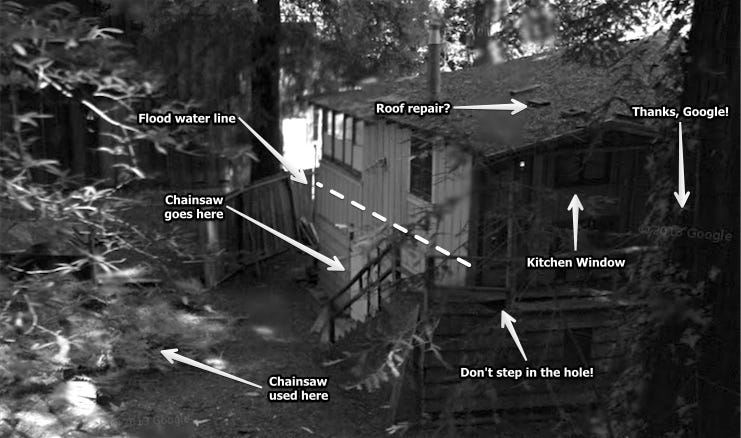If "it takes a village", then isn't polyamory ideal? Yet people will attack it on the grounds that it's "bad for the children." When it comes to polyfidelity at least, this is not the case at all. Having multiple sources of support can contribute to upward mobility,
as this man attests:
“Polyamory equals privilege.” It’s a sentiment I’m hearing more and
more often. As the story goes, the average single working parent with a
low-wage job has no time to go out on dinner dates, attend epic
debaucherous parties, and engage in various leisure activities with
their many lovers.
[...] This viewpoint seems to be gaining traction, maybe even reaching
dominance, as nonmonogamy becomes more visible. It’s buoyed in no small
part by media portrayals like Showtime’s intensely Caucasian Polyamory: Married and Dating,
a veritable festival of hot tubs, champagne, and $300 yoga pants. Or
the fact that, at least online, the poly community is mostly white and highly educated.
 |
| Is this how polyamory looks? |
It’s easy to see why people might come to think of polyamory, at least in the form they see today, as the purview of “rich, pretty people with too much time on their hands.” However,
this viewpoint fails to acknowledge the underprivileged nonmonogamists
among us — it serves to alienate the disadvantaged, to discourage them
from even trying it. This denies polyamory’s considerable economic,
social, and structural benefits to those who need them the most.
[...] I am a second-generation poly person, who grew up in the eighties. My
parents were quite poor when I was born, and I’ve experienced a great
deal of class mobility over the course of my life. I’ve witnessed
first-hand how economic privilege is not a requirement for nonmonogamy.
In fact, the nontraditional nature of my family directly facilitated my
own escape from a life of poverty. This is what it was like for me,
growing up poor in America with two moms and a dad.
 |
| My old house. |
[...] My biological mother’s family were immigrant farmers who fled postwar
Eastern Europe for the Midwest. She had attended some community
college, but left school and moved to California in her early twenties.
My mom had a dizzying array of entry-level jobs, from veterinary
assistant to school bus driver. Some of my earliest memories are of
standing with her for hours in the food stamp line in the town Veteran’s
Hall, and the giant bricks of mild yellow cheese we’d get from WIC.
My “other” mom, who as a small child I knew simply by her
first name, was also a farm girl. Her parents were devout Jehovah’s
Witnesses. Their family’s interpretation of the Scripture prohibited
them from allowing her to receive an education. When she met my parents
around the time I was born, she had a 3-year old daughter from a
previous, abusive, marriage, and was working as a minimum-wage retail
clerk. She taught me to read in the year before kindergarten.
My father’s mother was a widow, disowned by her family for
refusing to abandon a son with an intellectual disability. That same
son, my uncle, regularly abused my dad throughout his childhood and
adolescence. To escape his home life, my father joined a gang, which
kept him out of school, and led him into alcoholism and methamphetamine
addiction. He’s also an incredible surrealist painter. I believe that
his focus on art, coupled with his relationship with my mother, led him
through this long, hard phase of his life. By the time I was born he had
recovered from his addictions, but a host of complex medical issues
left him disabled, on a meager fixed income from SSI. He played a mean
game of pool, though, and would win local bar tournaments each winter so
that we could have Christmas presents.
We lived my entire childhood in a tiny shack in the Northern
California forest with only a wood stove for heat. [...] I learned to
live cheap by reusing and repairing everything. I’d hold the flashlight
while my dad, covered in grease, fixed our decrepit pickup truck. When
it was broken anyway we would bike miles down the highway, backpacks
full of groceries. At night, my mom would sit and watch TV while darning
socks stretched over a burned-out lightbulb.
[...] My parents all slept together in one big bed, on a pair of twin
mattresses pushed together. My dad would complain about falling into the
space between them, but it was what we could afford.
Things are very different for me now. After many years as a
successful software developer, I’m the founder of my own company, and
have made my home in the heart of one of the world’s most expensive
cities. My friends and I maintain a spacious workshop for building
large-scale tech art, and I curate a growing collection of passport
stamps. [...] I’m very lucky: my parents are remarkable people who care
deeply for me and did an admirable job of raising me. But, it certainly
didn’t hurt that there were three of them.

[...] If privilege can be defined as unearned advantage, then for my family
polyamory was not the result of privilege. Rather, it was a source of
it. I can see now that my parents’ triad provided them with the
resources and mutual support they needed to be so conscientious in
raising me and my two siblings. It freed them from many of the difficult
decisions a poor, working family often has to make: attend the PTA
meeting, or put in some overtime? Actively raise the children, or make
enough money to feed them? A three parent household has 50% more time,
income, and experience than a two-parent household. That counts for a
great deal.
[...] Had my own parents been monogamous, perhaps I’d have learned
to read a year or two later, denying me some of the academic advantage I
enjoyed for the entirety of my education. Maybe they would not have
been able to afford that obsolete computer they bought when I was a kid,
or the time to learn and then teach me Atari BASIC, which became the
foundation of my career (yes, I’m one of those insufferable geeks who
started programming when I was 8). Maybe when our house flooded in 1986, we’d have been left homeless,
without the resources to rebuild. These are a few clear examples, but
there’s a thousand other tiny things, from breastfeeding to bedtime
stories, that confer advantage to the children of parents with spare
time and extra cash.
Growing up, I was surrounded by the wreckage of relationships
destroyed by infidelity and divorce. Custody battles were a fixture of
my young existence, and I witnessed the toll they took on my friends’
lives. This experience is not unique: 57% of impoverished families in
America have a single parent. While I’ll be the first to admit that
relationships are complicated, I can’t help but wonder how those
families might have been different had the parents been skilled in
responsible nonmonogamy. If American culture valued a relationship’s
ability to change without ending, if we ascribed different meaning to
sexual fidelity, could some of those kids have retained a mom or a dad?
If we were better at recognizing our own ability to find love, sex, and a
co-parent in separate individuals, could those families have been
stronger?
[...] There is an earnest effort here to acknowledge a group’s humanity by
being sympathetic to their struggle. Yet, we cast the poor as cardboard
characters. Work, sleep, feed the kids, repeat. It’s just not like that.
Poverty is complicated. Discussions of privilege seek to promote
understanding, but overly reductive models can be marginalizing. They
deepen our class divide.
[...] There is room in most people’s lives for polyamory. It can even play a
significant role in helping to alleviate poverty, but it’s not a
magical solution. Not everybody is interested in nonmonogamy. It makes
dating easier in some ways and much harder in others. For the poor
especially, there are unique challenges brought on by the clash between
alternative sexuality and culture, religion, or prevailing community
values. In some places, the intersectional oppression that poor poly
people face might tip the scales: the community lost could be of greater
value than the community gained.
My family certainly had its trials. Cohabitation is hard, and a
three-person relationship is a tricky thing to manage. We were also, no
doubt, subject to considerable bigotry, especially back in the
eighties. As a child I was largely insulated from it. Still, from my
perspective it was entirely worth it. When I ask my parents, they have
no regrets.



No comments:
Post a Comment